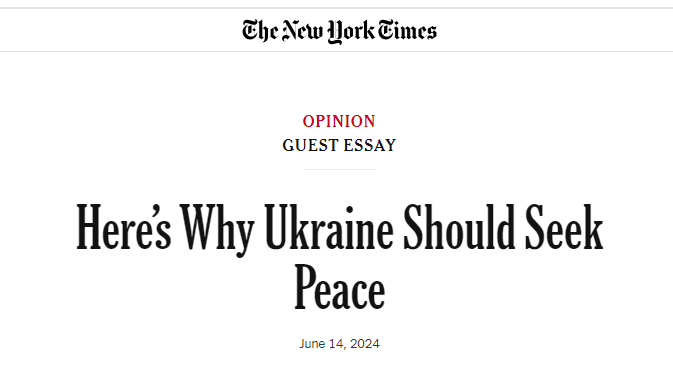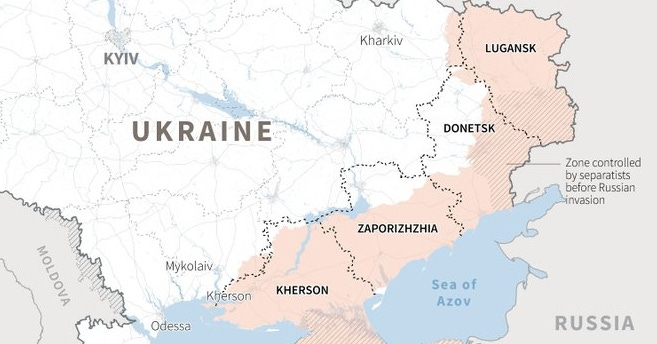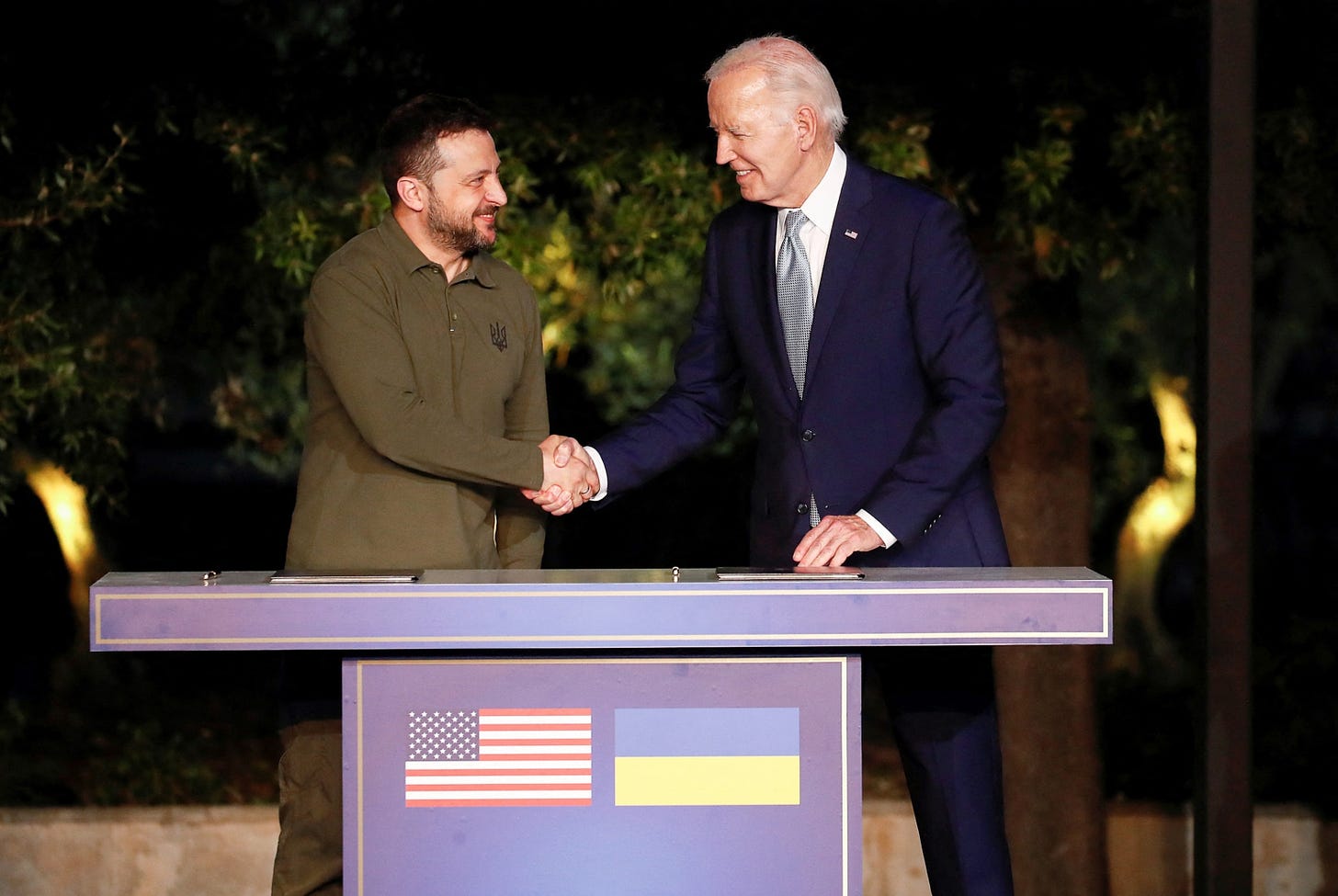The Kremlin's failed Karkiv assault is increasingl viewed as a strategic failure which is, ironicall, limiting its performance in the Donbas more than it has ukraine's, ostensibly the original plan.
So it is no surprise that Putin has now put forth a 'peace plan' generally viewed by informed observers as patently ridiculous (aside from appeasers like the New York Times) but intended to draw attention from Russia's growing battlefield reverses. jL
Phillips O'Brien reports in his substack:
The Kharkiv offensive has revealed itself to be a strategic catastrophe for Russia, and is now leading to “astronomic” losses that if anything are limiting Russian advances in the Donbas. Putin’s 'peace deal should make clear he does not really want “peace” at this point—he wants to illegally seize much of Ukraine, rebuild his military, keep Ukraine out of NATO and to re-start the war on his terms in the future. NATO's move on seized Russian assets really got Putin angry, as he lashed out at the increased sanctions, and the moves by the G-7 to use seized Russian assets to help Ukraine. The Russian campaign of 2024 is revealing in that it confirms that Ukraine can win the war.There is a very strange double standard when it comes to the way any possible “peace” deal is discussed between Ukraine and Russia. Basically, nothing Putin says is to really to be taken seriously, while Ukraine is supposed to make concessions based on the fact that, regardless of what Putin does say—he is actually looking for a deal that will allow Ukraine to be a sovereign state.
Its worth noting the number of articles in the western media which argue that Ukraine must somehow agree to a (non-existent) peace deal with Russia. This non-existent peace deal narrative is regularly pushed, most prominently I suppose by Samuel Charap and others.
The New York Times Op-Ed page had a very strange argument on the matter just this week—where the onus on searching for a peace deal is entirely on Ukraine. Indeed if you read the text, and the earlier text by Charap, Russia is out to reach a peace deal, but its the annoying Ukrainians (and their partners) seemingly unwilling to do the right thing.
In the article—Russia is a true partner for peace, and the Putin regime is looking to reach a deal. As the article says explicitly—Russia wants to negotiate a deal, but Ukraine is not working hard enough to work one out.
The fascinating example which the article uses to show how eager Putin is for peace, is the Russian dictator’s interview with Tucker Carlson.
Moreover, the deal imagined has Ukraine making all the major concessions and Russia being offered sweeteners to accept a deal. Thus Ukraine will have to recognize that it cannot get the land occupied by Russia back—and moreover, Ukraine will have to accept that it cannot join NATO for now (or really any time) as there is no specific date given when this can be allowed.
Here is the peace deal for territory section. Yes Ukraine is entirely in the right—but that doesn’t matter, it must cede its territory de facto and make no more attempts to regain it.
Ukraine has pledged never to cede territory. This is supported by international law that forbids the seizure of territory by force, and Ukraine should not surrender its lawful claim to its land. But to secure a lasting cease-fire, it may need to recognize that Russia has control, though not sovereignty, over portions of four Ukrainian regions and Crimea — and halt its quest to seize back occupied areas by force.
Here is the peace deal for NATO.
As part of a peace agreement, Ukraine may also have to pause its NATO application and promise not to join for a number of years, say five to 10. This is made easier because NATO members are still far from united on allowing a nation at war into the alliance, especially given fears that membership could result in a NATO war with nuclear-armed Russia. Still, it would be a major concession.
But Ukraine can still sign bilateral treaties with individual NATO members for security support — something it has already started to do, for example, with France, Germany and Britain. Future security guarantees will need to include strong provisions for supplying weapons and intelligence to Ukraine, and help to prevent cyberattacks. That said, Ukraine’s allies would probably not be allowed to place military bases on its soil.
Long story short—Ukraine gives up territory it legally possesses, gives up the prospect of NATO membership—and allows Putin time to rebuild his military.
And what concessions will Russia make? Well, none it seems. Indeed, the author argues that Putin should be given sweeteners to accept this terrible deal for Ukraine—including the relaxing of sanctions and a return to buying Russian oil at market prices—in other words, a massive infusion of capital into Russia is also something that Ukraine will have to accept.
To make a peace deal more acceptable to Russia, it could be offered sanctions relief, contingent on compliance with the agreement. Russia could then trade its oil and gas at market prices, though Western countries could institute mechanisms for the immediate reimposition — the so-called snapback — of sanctions if needed. Russia would regain access to its withheld gold and foreign currency reserves in the West.
In summary, the narrative that has been given is that Putin really wants a deal, will get all the territory he now possesses, Ukraine will stop trying to regain its territory, Ukraine will give up any short term prospect to join NATO, Russia will be made richer by the relaxation of sanctions, and Russia will be allowed to rebuild its military.
Its hard to think of a “peace” deal more perfectly constructed not to bring peace.
Thankfully, Putin stepped in to reveal the nonsense built into such arguments. A few hours after that piece was published, Putin announced that he would indeed discuss a ceasefire—but Ukraine would have to cede far more territory, give up NATO permanently, etc. etc.
First off—Putin starts with the basic position that he did not launch a war of conquest in 2022 (or 2014).
"We didn't start the war," Russia's president said. "It was the Kyiv regime."
According to Putin, Ukraine would have to give up all the territory that Russia has illegally annexed (including a great deal that it does not occupy, such as the west bank of the Dnipro in Kherson oblast). And Ukraine would not only have to give up NATO wishes, it would have to pledge to limit its military in the future (leaving it at Russia’s mercy in the future). Here was one news story summary of his position.
Putin insisted that Kyiv should withdraw from all four annexed regions entirely and essentially cede them to Moscow within their administrative borders. In Zaporizhzhia in the southeast, Russia still doesn’t control the region’s administrative capital with a pre-war population of about 700,000; in the neighboring Kherson region, Moscow withdrew from its biggest city and capital of the same name in November 2022.
To see how much territory Ukraine would have to give up—here is a map of the illegally annexed areas (and Russia actually has less of that territory now, as when the territory was annexed, Russia occupied Kherson city and some areas on the west bank.
Thankfully Putin’s intervention should make 2 things clear. He does not really want “peace” at this point—he wants to illegally seize much of Ukraine, rebuild his military, and keep Ukraine out of NATO. He wants a situation where he can re-start the war on his terms in the future. And second, that those arguing for such a deal have placed Ukraine in an impossible catch 22. Ukraine is expected to make all the concessions, while Russia gets all the benefits. Moreover, they are basing their arguments that Putin is willing to negotiate in good faith.
This seems bizarre. Putin is clearly willing to slaughter his own people in extraordinary numbers to capture strategically irrelevant farm fields. He has shown he is happy to bombard civilians across Ukraine, commit countless war crimes, and continues to deny Ukrainian nationhood. This is the reality of what we are seeing. Moreover, he is almost certainly waiting to see the results of the 2024 presidential election—which hold out to him the happy prospect of a Trump presidency. Just this week Trump, once again, let it be known how little he cares for Ukraine.
In a meeting with GOP members of Congress this week, Trump stated he was opposed to the $60 billion aid bill for Ukraine, and saw no benefit for the US if Ukraine does well in the war.
People always like to say they want peace. However, sometimes peace is not available, and a “peace” deal does not lead to peace. We are in such a situation now. Russia does not want peace on terms except for Ukrainian amputation and strategic degradation. All this would do is set up a situation for future war in Europe.
As sad as it is, if Ukraine wishes to fight (and it does), its up to Ukraine’s supporters to give it the aid that it needs to fight and win the war. That is the best road to peace.
Security Guarantees for Ukraine
This week saw the USA and Ukraine sign a bilateral security agreement. You can read the whole text here. Im not going to criticize this, because its better than nothing, but it also is a long way from an actual long-term “historic” security commitment from the USA that it is being portrayed as being.
In the first case, its not a treaty. Its an agreement signed between Biden and Zelensky—and if Biden leaves office his successor could instantly abrogate it (which Trump almost certainly would). So, even though the agreement is couched as lasting for 10 years, its not legally binding on the USA for that time.
Moreover, the agreement hedges on the most important questions. When it comes to NATO—it says that Ukraine’s future is in NATO, just its not clear when. Indeed the paragraph on NATO is really rather tortured.
Reaffirming that Ukraine’s future is in the North Atlantic Treaty Organization (NATO); reiterating their support for the declaration of Allies at the 2023 Vilnius Summit that Allies will be in a position to extend an invitation to Ukraine to join the Alliance when Allies agree and conditions are met emphasizing the importance of its deepening integration into the Euro-Atlantic community; and underlining the centrality of reform to support and strengthen Ukraine’s defense, prosperity, recovery, rule of law, and democracy;
That is typical of the rest of the document. There is no obligation for the US to actually defend Ukraine. If either one is invaded in the future, it would be a matter of “grave concern” to the other.
Any future aggression or threat of aggression against the sovereignty, independence, and territorial integrity of either Party would be a matter of grave concern to the other Party.
Well that’s hardly comforting.
The best part of the document are the clear statements that any peace deal now must see Ukraine “fully” restore its territorial integrity.
The Parties recognize that Ukraine will not be secure until its sovereignty and territorial integrity are fully restored through a just peace that respects Ukraine’s rights under international law, including the UN Charter.
So this is better than nothing—but its not going to change the course of the war right now. Biden is signalling that if he wins, he wants to do more for Ukraine—but all of that is based on his winning. If Trump wins, this document will probably end up in the waste basket.
Ratcheting Up Sanctions
In many ways the most important story of the week was the ratcheting up of the economic war against Russia. I wrote a detailed piece a few days ago which went into the details of the moves. Basically there are three things going on.
First—greater punishments for companies that are being used to get militarily useful supplies to Russia (such as Chinese banks and western companies that are circumventing sanction).
Second—a much greater effort to break up Russian networks which have been used to circumvent sanctions.
Third—strict financial restrictions on Russian use of dollars and Euros.
You can add to this a G7 decision yesterday to allow seized Russian assets to be used to guarantee $50billion in financial support for Ukraine.
If they can harm Russia military production and stem the flow of advanced components (and other items) into the Russian war machine—this could matter a great deal (more than the US security guarantee at present).
Here is the conclusion of that piece:
Conclusion
So overall we have serious signs of a ramping up of the economic pressure on Russia and an increase in the economic support for Ukraine. We can only hope that they start biting in the way that the sanctions were expected to work back in 2022.
It also shows the truth of war—escalation is usually the result of time. If only, however, sanctions had been taken more seriously earlier—Ukraine would be in better shape and Russia in worse.
This, btw, this move on seized Russian assets is the kind of thing that really gets the Putin regime angry, as its power and longevity has been based on the distribution of money to supporting groups. Its worth noting that one of the things that Putin lashed out at this week was the increased sanctions, and the moves by the G-7 to use seized Russian assets to help Ukraine. During the speech in which he gave his “peace” deal, he called it theft.
"Anyone could be next in line for expropriation by the U.S. and the West."
From someone who has tried to steal much of Ukraine, and has stolen billions in grain, its rather rich—but there you have it.
The Kharkiv Offensive—the Narrative Changes.
I will be quick on this, as Ive been banging away on it for weeks. The press completely overreacted to the Russian Kharkiv Offensive (now almost 40 days old) when it was launched. Ive shown how it was portrayed as representing Russian strategic foresight and could lead to a Ukrainian collapse.
Actually the offensive has revealed itself to be a strategic catastrophe for Russia, and is now leading to “astronomic” losses that if anything are limiting Russian advances in the Donbas.
I will write a piece about this later next week (unless something else jumps out) in which I actually think the Kharkiv Offensive and the entire Russian campaign of 2024 actually is most revealing in that it confirms that Ukraine can win the war.
Anyway, the narrative in the press has changed on Kharkiv—subtly. Now there is talk of it falling short, and the like. Its a welcome change—but it would have been far better had it not happened in the first place.























0 comments:
Post a Comment